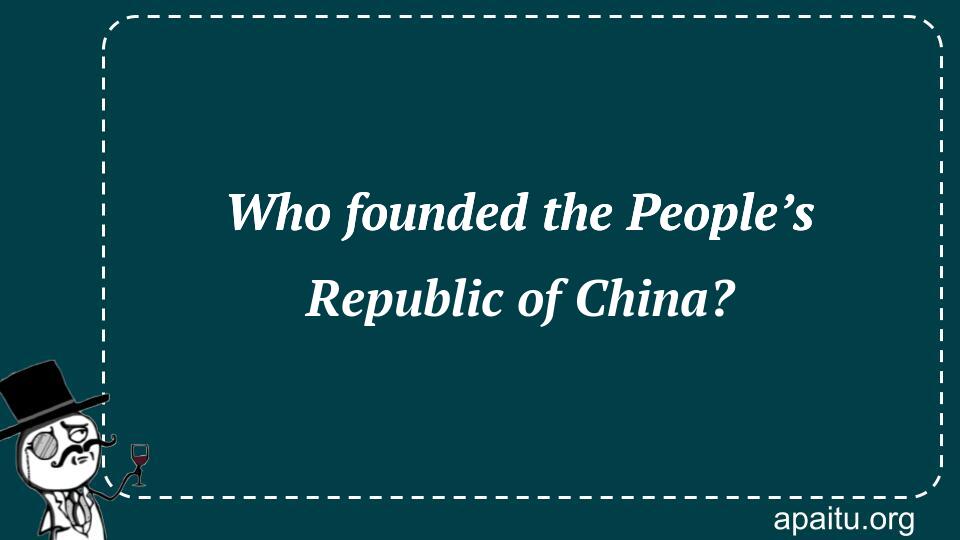Question
Here is the question : WHO FOUNDED THE PEOPLE’S REPUBLIC OF CHINA?
Option
Here is the option for the question :
- Chiang Kai-shek
- Mao Zedong
- Deng Xiaoping
- Xi Jinping
The Answer:
And, the answer for the the question is :
Explanation:
Mao Zedong announced the establishment of the People’s Republic of China in 1949, shortly after his party had triumphed over Chiang Kai-shek’s nationalist party and won the war. The Chinese Communist Party, led by Mao Zedong, instituted significant reforms to Chinese society, including the collectivization of agriculture and the nationalization of all enterprises. In the end, Mao’s policies were responsible for the deaths of millions of people as a result of starvation and persecution.

Mao Zedong is a name that is synonymous with the foundation of the People’s Republic of China. He was born on December 26, 1893, in the Hunan Province of China. Mao’s early life was marked by struggles, poverty, and political upheaval. However, he went on to become one of the most influential leaders in modern Chinese history.
Mao began his political career as a Marxist organizer and activist during the 1920s. During this time, he helped to establish the Communist Party of China (CPC) and worked alongside other leading figures such as Zhou Enlai and Deng Xiaoping. Mao’s rise to power began in the aftermath of the Long March, a grueling 6,000-mile journey undertaken by the CPC in 1934-1935 to escape the encroaching forces of the Nationalist government.
In the years following the Long March, Mao emerged as the undisputed leader of the CPC. He led the party’s efforts in the Chinese Civil War, which ultimately resulted in the defeat of the Nationalist forces and the establishment of the People’s Republic of China on October 1, 1949. Mao was named Chairman of the Central People’s Government, a position he held until 1959.
Under Mao’s leadership, China underwent significant political, social, and economic changes. He implemented a series of reforms aimed at transforming China into a socialist state. These included land reform, the collectivization of agriculture, and the establishment of state-owned enterprises. Mao also launched a series of campaigns aimed at eradicating what he saw as the remnants of feudalism and capitalist thinking.
One of Mao’s most significant initiatives was the Great Leap Forward, a massive industrialization and modernization campaign launched in 1958. The campaign aimed to transform China’s economy and society in just a few years. However, it ultimately led to widespread famine and economic chaos, and is widely regarded as a failure.
Mao’s other major campaign was the Cultural Revolution, launched in 1966. The campaign aimed to purge China of what Mao saw as counter-revolutionary elements and to reassert his control over the Communist Party. The Cultural Revolution led to widespread violence, persecution, and social upheaval, and is considered one of the darkest periods in modern Chinese history.
Mao’s legacy, therefore, is a complex one. He is revered by many as a founding father of modern China and a champion of the country’s sovereignty and independence. However, he is also criticized for his authoritarianism, his policies that led to famine and social upheaval, and the human rights abuses committed during the Cultural Revolution.
Mao remains a towering figure in modern Chinese history. His legacy continues to shape Chinese politics, society, and culture to this day.